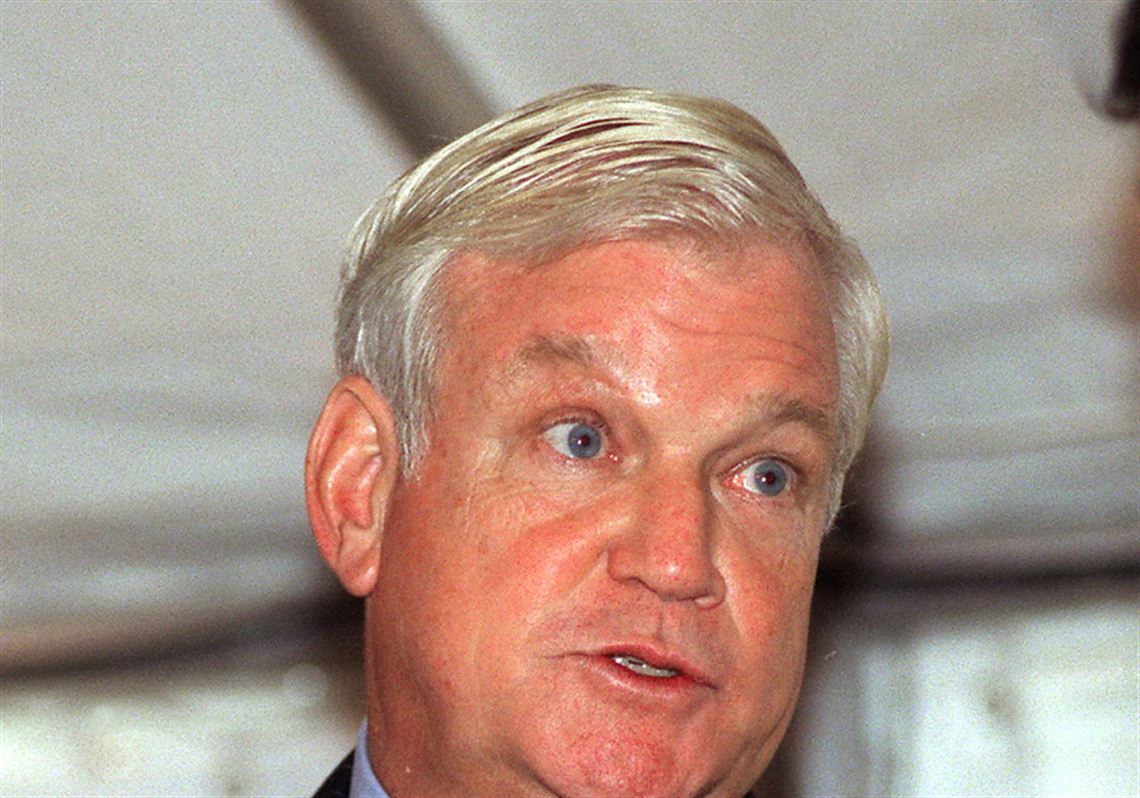Richard M. Scaife, an heir to the Mellon fortune who became one of America’s leading funders of conservative causes and the publisher of the Tribune-Review, died Friday morning. He was 82.
A shy, even reclusive, man who was both among the biggest benefactors and biggest enemies of U.S. presidents, Mr. Scaife was one of the few Western Pennsylvanians to end up on the annual Forbes list of wealthiest Americans. The magazine last year estimated the Shadyside resident's worth at $1.4 billion.
He began experiencing serious health problems in late 2012, when he was hospitalized for months with pneumonia and a collapsed lung. In a newspaper column on May 18, he disclosed that he had recently been diagnosed with untreatable cancer.
"Some who dislike me may rejoice at this news. Naturally, I can't share their enthusiasm," he noted with wry reference to how he could be a prominently polarizing figure.
Mr. Scaife may have been best known locally as owner of the Tribune-Review Publishing Co., which puts out editions in Pittsburgh and Greensburg in addition to operating other daily newspapers. He was also a prominent philanthropist for the past half-century through funding of the art museum at The Carnegie, the historic redevelopment of Station Square and numerous other institutions.
The Ligonier native's influence, however, ranged far beyond Pittsburgh, Westmoreland County and the rest of the region where he spent his life.
He donated widely not just to Republican political candidates -- Barry Goldwater's presidential run in 1964 was among the first -- but to the think tanks, research institutes and university departments whose work has been closely tied to the ascendancy of right-wing ideology since the Reagan presidency.
The public foundations and private trusts controlled by Mr. Scaife have been major backers of the Heritage Foundation, Cato Institute, American Enterprise Institute, Hoover Institute in California and the Georgetown University Center for Strategic and International Studies, among many institutions linked to the right. "He is nothing less than the financial archangel for the movement's intellectual underpinnings," the Wall Street Journal once said of Mr. Scaife.
Mr. Scaife was one of the original financial backers and Vice Chairman of the Board of Trustees for the Heritage Foundation, a Washington, D.C.-based conservative think tank. In a prepared statement, foundation president Jim DeMint and Heritage founder Edwin Feulner described Mr. Scaife as a “man of vision as well as conviction.”
“Dick Scaife was instrumental in creating a new breed of public policy institute in Washington that many deemed ‘risky,’ even ‘ill conceived,‘” the statement read. “Dick’s steadfast support since 1973 allowed Heritage to become not only a permanent institution in Washington, but a permanent player in the public debate.”
Most of those contributions came outside of the spotlight, but Mr. Scaife's visibility grew during the Clinton presidency. He was identified as the key funder of efforts in the non-mainstream media to discredit Bill and Hillary Rodham Clinton -- she called his the money behind "a vast right-wing conspiracy" -- by investigating their pre-White House financial dealings.
Later Mrs. Clinton, a presidential candidate in 2008, won over Mr. Scaife and won his newspaper's endorsement, one of the most startling turnarounds in a life punctuated by startling events.
In a detailed examination more than a decade ago, The Washington Post estimated Mr. Scaife's trusts and foundations had by then given $340 million to conservative causes.
Though he rarely consented to interviews for any publication, he did emphasize his libertarian views at that time to the newspaper. "Our funding is based on our support of ideas like limited government, individual rights and a strong defense," he said in a written response. "My concerns are for the freedom of individuals."
Jim Roddey, the Allegheny County Republican Party chairman and former county executive, said people were often surprised to learn that Mr. Scaife -- unlike some right-wing extremists -- was pro-choice and a supporter of gay marriage and legalization of marijuana. He also backed some Democrats he felt shared his viewpoints, such as the late Congressman John P. Murtha of Johnstown, and his generosity was far-reaching beyond the political world.
"His contributions to the community were for everyone, not just conservative politicians, and they've touched everyone, whether they realize it or not," said Mr. Roddey, who has served on the board of the Scaife Foundation. "The Scaife contributions to a variety of arts organizations and education have been large and generous and made a difference in the community."
A steady stream of condolences and reaction to Mr. Scaife‘s death poured in Friday, from both sides of the political aisle.
“Dick Scaife was a passionate advocate for the promise of the free market, and his efforts played a leading role in the development of the modern conservative movement,” said Rob Gleason, chairman of the Pennsylvania Republican Party. “I am proud to have known him, and even prouder to have had the chance to call him my friend.”
"Although we differed on politics, we never differed on our love of Pittsburgh. I got to know Mr. Scaife late in his life, and we shared stories and our love of this great city,” Pittsburgh Mayor Bill Peduto said in a statement. “His investments and contributions to Pittsburgh will be remembered for generations."
Gov. Tom Corbett said Mr. Scaife’s passing ”marks the departure of a man whose vision and generosity shaped Pittsburgh’s progress and our nation’s course.“
“His investment in think-tanks reshaped our nation’s political dialogue and delivered the opening salvos in the Reagan revolution, replacing tired nostrums with vigorous new ideas for progress,” Mr. Corbett said in a statement today.
The governor also said Mr. Scaife‘s contributions to civic causes helped preserve Pittsburgh’s landmarks and ”filled the walls of its museums with artwork that captured the beauty and nuance of life.“
U.S. Senator Bob Casey praised Mr. Scaife for his charitable works. ”I also came to know Mr. Scaife personally and appreciated his kindness,“ Mr. Casey said in a prepared statement. ”I enjoyed visiting his home and was grateful for the conversations we had. My thoughts and prayers are with his family at this time.”
State House Majority Leader Mike Turzai said in a prepared statement he considered Mr. Scaife a personal friend. “He took the time to meet with me on many occasions, and I relished the opportunity to engage in discussions with him about so many people, places and issues,” the statement read. “He was profoundly well read, well spoken, knowledgeable and most importantly, he was so gracious to everyone I ever saw him interact with.”
Mr. Scaife's life began in Ligonier, the son of Alan and Sarah Mellon Scaife. His mother was the daughter of Richard Beatty Mellon and sister of Richard K. Mellon, the latter being the powerful but moderate Republican who teamed up with Democratic Mayor David L. Lawrence on Pittsburgh's first Renaissance.
The Mellon family was one of the richest in America, making a fortune from its interests in banking, Gulf Oil Corp. and Alcoa. After the deaths of both of his parents before he was 35, Mr. Scaife inherited hundreds of millions of dollars, as did his only sibling, his late sister Cordelia M. Scaife.
His childhood was not considered happy. He suffered a serious head injury when thrown from a horse at age 9, rendering him homebound for months.
After attending Deerfield Academy in Massachusetts, he flunked out of Yale University as a freshman -- and that was after being suspended from the school for involvement in an out-of-control party that landed him in jail for a night.
Mr. Scaife returned home to attend the University of Pittsburgh, where he graduated with a degree in British history in 1957. His father died the very next year, and he immersed himself thereafter in the family's business interests. After his mother's death in 1965, he took on a larger philanthropic role, though he was more politically oriented with the money than Sarah Scaife had been.
He had control of the Sarah Scaife, Allegheny and Carthage foundations, which were known locally for supporting non-partisan causes such as the arts and historic preservation.
But by the time the 1950s ended, Mr. Scaife had also viewed and opposed a liberal shift taking place in the country, which included a stronger government role apparent in the Kennedy and Johnson administrations. He supported the ultra-conservative Mr. Goldwater's failed presidential bid and the successful presidential campaigns afterward of Richard Nixon, to whom he gave $1 million in 1972.
More relevant to his local roots, he spent hundreds of thousands of dollars in the 1990s to spur creation of the Allegheny Institute for Public Policy, which became a conservative voice on Western Pennsylvania issues long dominated by liberal or centrist Democrats.
Mr. Scaife more so made his mark in Western Pennsylvania as a publisher, an interest apparently rooted in his childhood, when among his hobbies were cutting out important news articles and saving historic front pages.
He acquired the Tribune-Review of Greensburg in 1969. In 1992 he took advantage of labor strife and publication halt at Pittsburgh's two newspapers to add a Pittsburgh edition of the Trib. At one time he also owned the Sacramento Union newspaper and Pittsburgher magazine, both now defunct, in addition to KQV-AM, the radio station devoted to a news format.
Over the years Mr. Scaife suffered accusations of using his publications to unduly advance his political views.
In his early days in charge of the Greensburg newspaper, his top editor and half his staff quit on him, reportedly over his firing of a reporter who had disparaged President Nixon and Vice President Spiro Agnew after Agnew's resignation.
But he also was responsible for turning the Trib into a player in the Pittsburgh media after the close of The Pittsburgh Press in 1992. When thwarted in efforts to purchase the Press, he poured resources into making the Pittsburgh Tribune-Review a competitor to the larger Pittsburgh Post-Gazette. He also acquired at least a half-dozen smaller papers around Western Pennsylvania to enlarge the influence of Trib Total Media.
William Green, a conservative local political analyst, said Mr. Scaife served a valuable purpose with his newspaper interests, when many of his peers in the media were more liberal.
"There's no doubt he was one of the more forceful conservative publishers of our time," Mr. Green said. "He had an independent voice that irritated some people but also satisfied some people."
Of all the political or community undertakings he backed throughout his life, Mr. Scaife himself said in his May 18 column, "None has given me as great a sense of accomplishment as the newspapers of Trib Total Media."
Mr. Scaife's devotion to media influence came with a price. Legal documents that inadvertently became public in 2007 in a bitter divorce case with his second wife, Margaret, showed one of his trust funds had been subsidizing annual losses of $20 million to $30 million by the Pittsburgh Tribune-Review. Recent knowledgeable estimates put the figure much higher.
Among other contributions, Mr. Scaife's foundations funded an early expansion of the Pittsburgh Aviary, development of the Sarah Scaife Gallery at The Carnegie and enhancement of the Westmoreland Museum of American Art in Greensburg. His money was vital to the redevelopment of Station Square and provided more than $1.4 million for the Boys and Girls Clubs of Western Pennsylvania. After a 2005 tsunami in the Pacific devastated numerous nations, he contributed a reported $1 million to the relief effort through Catholic Relief Services.
Most surprisingly, perhaps, this frequent enemy of Democratic politicians -- a man who had spearheaded efforts to embarrass the Clinton administration -- was reported in 2010 to have become a six-figure contributor to the William J. Clinton Foundation, the ex-president's charity to work on global improvements.
In 2008, Mr. Scaife also welcomed Mrs. Clinton, at that time a candidate for the Democratic presidential nomination, to a cordial editorial board meeting in the Pittsburgh Tribune-Review offices. By then, the rancor between them appeared to have evaporated.
From his first marriage, he had two children, Jennie King Scaife, of Palm Beach, Fla, and David Negley Scaife, of Squirrel Hill.
Funeral arrangements will be private.
Gary Rotstein: grotstein@post-gazette.com or 412-263-1255.
First Published: July 4, 2014, 4:00 a.m.
Updated: July 6, 2014, 12:05 a.m.


















